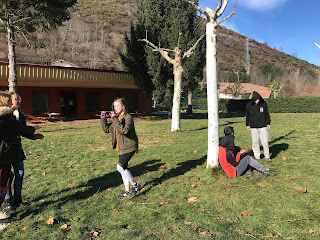Erasmus+
Erasmus+ is the EU's programme to support education, training, youth and sport in Europe. Its budget of €14.7 billion will provide opportunities for over 4 million Europeans to study, train gain experience, and volunteers abroad. It is open to many individuals and organisations, although eligibility varies from one action to another and from one country to another. Individuals can take part in many of the opportunities funded by Erasmus+, although most will have to do so through an organisation taking part in the programme. The eligibility of individuals and organisations depends on the country in which they are based.
To learn more about this programme, please enter on its official webpage or watch this video.
The EU funds youth exchanges which give young people the chance to experience another country and work together in a team. It's an opportunity to gain skills in areas such as project management and to improve your foreign language proficiency. Youth exchanges take place outside the school environment and offer a structured programme (eg with a mix of workshops, exercises, debates and role play). The exchanges are open to young people aged 13-30 and last from 5 to 21 days. They can be in another Member State or outside the EU. They enable young people to discover new cultures and friends, develop new competences, and better appreciate values like solidarity and democracy. The learning process is based on non-formal education and involves at least two organisations (sending and receiving) from different countries within or outside the EU. To participate in a youth exchange project you need to link-up with a participating organisation. It can be a non-profit organisation, association, NGO, public body at local, regional or national level or a social enterprise. It applies for youth exchange funding via the Erasmus+ National Agency in the country in which it is established.
To learn more about this programme, please enter on its official webpage or watch this video.
Among all the actions on which Erasmus+ is divided, the Key Action 1 is focused on the mobility of individuals as a learning process. This action on the field of youth is open to all young people, not just those involved in education or training. With Erasmus+, you can volunteer in Europe or outside of Europe or participate in a youth exchange abroad.Young people have the opportunity to participate in youth-exchanges or to volunteer for a period up to one year in another country. Youth workers can take part in training and networking activities abroad or spend some time in a youth organisation abroad for a job shadowing or an observation period.
To discover which opportunities can Erasmus+ offer under this action for young people and youth workers, please enter on the specific website about it.
Youth exchanges
The EU funds youth exchanges which give young people the chance to experience another country and work together in a team. It's an opportunity to gain skills in areas such as project management and to improve your foreign language proficiency. Youth exchanges take place outside the school environment and offer a structured programme (eg with a mix of workshops, exercises, debates and role play). The exchanges are open to young people aged 13-30 and last from 5 to 21 days. They can be in another Member State or outside the EU. They enable young people to discover new cultures and friends, develop new competences, and better appreciate values like solidarity and democracy. The learning process is based on non-formal education and involves at least two organisations (sending and receiving) from different countries within or outside the EU. To participate in a youth exchange project you need to link-up with a participating organisation. It can be a non-profit organisation, association, NGO, public body at local, regional or national level or a social enterprise. It applies for youth exchange funding via the Erasmus+ National Agency in the country in which it is established.
You can get to know more about youth exchanges on the website of the programme about these activities or watching this video about what a youth exchange means.



Comentarios
Publicar un comentario